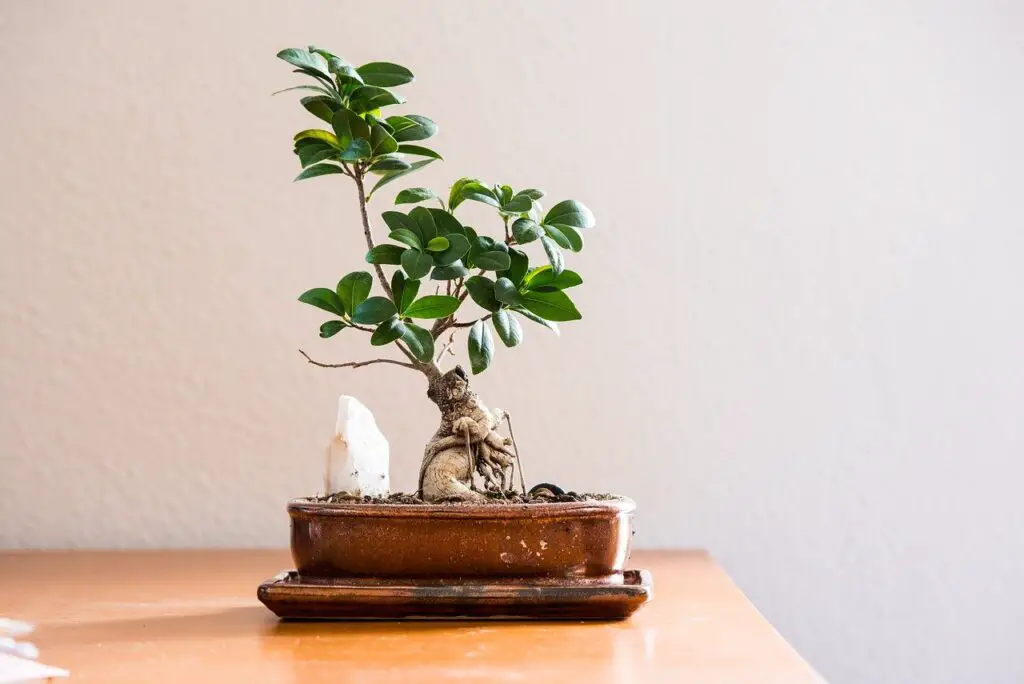You can shift to a plastic-free lifestyle by making simple, strategic changes in your daily routine. Start with a waste audit to identify plastic usage, then replace disposable items with reusables like cloth bags, glass containers, and beeswax wraps. Focus on high-impact areas like your kitchen and bathroom, switching to plastic-free alternatives such as bamboo toothbrushes, bar soaps, and stainless steel food storage. Make sustainable shopping a habit by bringing your own containers to bulk stores and farmers' markets. These initial steps will set you on the path to discovering more ways to eliminate plastic from your life.
Getting Started With Zero Waste
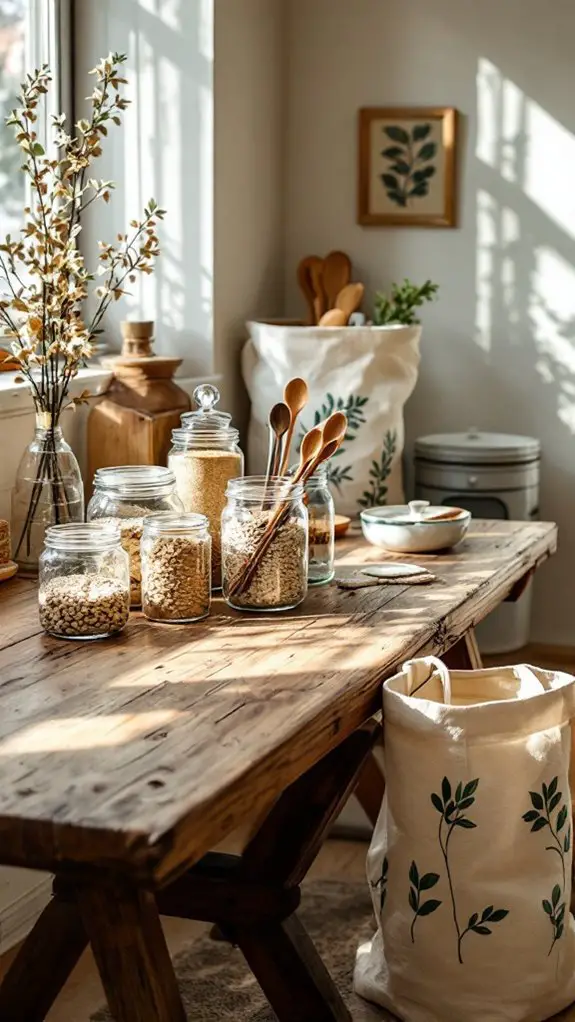
Every journey toward zero waste begins with small, manageable steps. You'll find it easier to maintain long-term changes by focusing on one area of your life at a time rather than attempting a complete overhaul. Start by conducting a waste audit – collect and analyze your household trash for a week to identify your main sources of plastic waste.
Once you've identified your primary waste sources, target the easiest changes first. Replace disposable items with reusable alternatives: swap plastic shopping bags for cloth ones, use a refillable water bottle instead of buying bottled water, and invest in reusable produce bags. You'll quickly discover these switches save money while reducing waste.
Next, establish new shopping habits. Bring your own containers to bulk stores for dry goods, choose products with minimal or no packaging, and shop at farmers' markets where fresh produce doesn't come wrapped in plastic. You'll need to locate stores that support zero-waste shopping in your area and prepare your shopping kit with containers and bags.
Focus on your bathroom and kitchen next, as these areas typically generate the most plastic waste. Switch to bar soap, shampoo bars, and plastic-free dental care products.
In the kitchen, replace plastic wrap with beeswax wraps, use glass containers for storage, and opt for wooden or stainless steel utensils. Stay organized by keeping your reusable items easily accessible and maintaining a list of plastic-free alternatives as you discover them.
Kitchen Plastic Swaps
Making the switch from plastic kitchenware takes up a significant part of your zero-waste journey. Your kitchen likely contains numerous plastic items, from food storage containers to cooking utensils, but you can replace each one with sustainable alternatives that'll last longer and keep harmful chemicals away from your food.
Start by swapping out plastic food storage containers with glass jars, stainless steel containers, or beeswax wraps. These alternatives won't leach chemicals into your food and can handle both hot and cold temperatures. Replace plastic wrap with silicon stretch lids or cloth bowl covers, which are reusable and work just as effectively.
For cooking utensils, choose wooden spoons, bamboo spatulas, and metal tongs instead of their plastic counterparts. They're more durable and won't scratch your cookware.
Switch to a wooden dish brush and natural fiber sponges for cleaning, and use metal or bamboo straws instead of plastic ones.
Consider replacing your plastic cutting boards with wooden or bamboo alternatives, which are naturally antimicrobial and won't dull your knives as quickly.
For shopping and storage, keep mesh produce bags, cloth bread bags, and large glass jars handy. You'll also want to invest in stainless steel ice cube trays and popsicle molds.
Don't feel pressured to replace everything at once. As your plastic items wear out, gradually replace them with sustainable alternatives. This approach is both economically and environmentally responsible, ensuring that you're not creating unnecessary waste during your shift.
Sustainable Shopping Habits
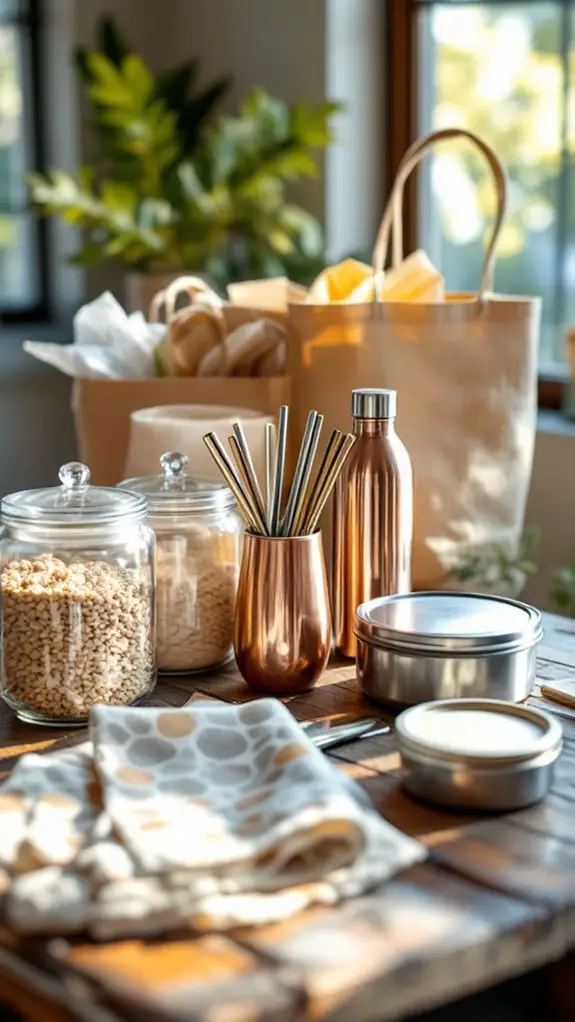
Transform your shopping routine by adopting sustainable habits that minimize plastic waste and environmental impact. Start by always carrying reusable shopping bags, produce bags, and containers when you head to stores. Before shopping, make a detailed list to avoid impulse purchases that often come in unnecessary packaging.
Choose bulk shopping whenever possible. Bring your own containers to fill with dry goods, spices, nuts, and grains. Many stores now offer bulk sections for household cleaners and personal care products too. When selecting products, opt for items packaged in glass, metal, or cardboard instead of plastic. Look for concentrated versions of products to reduce packaging waste.
Shop at farmers' markets and local shops where you'll find fresh, unpackaged produce. Build relationships with vendors who'll let you use your own containers for meats, cheeses, and prepared foods. Consider joining a CSA (Community Supported Agriculture) program that delivers seasonal produce in minimal packaging.
Plan your shopping trips efficiently by visiting multiple stores in one journey. Research which stores in your area support zero-waste shopping and prioritize them. Don't forget to check secondhand stores first when you need household items or clothing.
When shopping online, group your purchases to reduce shipping materials and choose plastic-free packaging options when available. Keep track of your most-used items and search for plastic-free alternatives before you run out. This prevents last-minute purchases that might compromise your sustainable shopping goals.
Bathroom Essentials Without Plastic
Once you've mastered sustainable shopping habits, your bathroom presents the next opportunity to eliminate plastic waste. Your daily hygiene routine likely involves multiple plastic containers, from shampoo bottles to toothpaste tubes, but you can easily replace these with sustainable alternatives.
Start with your shower essentials by switching to package-free shampoo and conditioner bars. These concentrated products last longer than liquid versions and don't require plastic containers.
For body cleansing, choose natural bar soap wrapped in paper or stored in metal tins. You'll find these products at zero-waste shops or can order them from eco-friendly online retailers.
Replace your plastic toothbrush with a bamboo alternative, and switch to tooth tablets or powder in glass jars instead of traditional toothpaste tubes.
For dental floss, look for versions made from silk or bamboo charcoal that come in refillable glass containers. Consider a safety razor with replaceable metal blades instead of disposable plastic razors.
For skincare, opt for face oils and moisturizers in glass bottles, or try package-free moisturizing bars. Choose deodorant in cardboard tubes or glass jars, and make the change to menstrual cups or organic cotton products with plastic-free packaging.
Store items in mason jars or metal containers, and use wooden or bamboo accessories like combs and hairbrushes.
Keep in mind that adapting doesn't need to happen all at once. Replace items with plastic-free alternatives as your current products run out, making the shift both manageable and cost-effective.
Zero Waste Cleaning Solutions
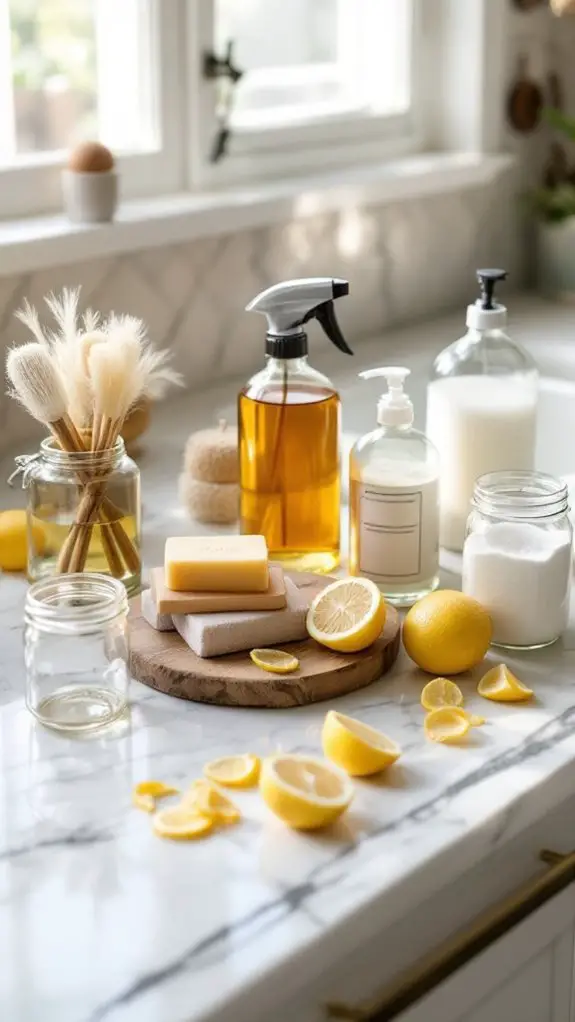
Household cleaning products typically come packaged in plastic spray bottles and containers, but you don't need these commercial options to maintain a spotless home. You can create effective cleaning solutions using simple, natural ingredients stored in glass jars and bottles.
Mix one part white vinegar with one part water in a glass spray bottle for an all-purpose cleaner that tackles grease, grime, and bacteria. For tougher jobs, add 10 drops of essential oils like tea tree, lemon, or eucalyptus to boost cleaning power and create a pleasant scent.
Baking soda serves as a gentle abrasive for sinks, tubs, and toilets – simply sprinkle it on surfaces and scrub with a wooden brush or compostable sponge. Create a paste using baking soda and water to clean stubborn stains, or combine it with vinegar for a powerful drain cleaner.
Castile soap, available in bar form or in bulk, works perfectly for hand washing dishes when paired with a wooden dish brush. For laundry, try soap nuts or powder detergent sold in cardboard boxes.
Store your homemade cleaners in repurposed glass bottles, mason jars, or other reusable containers. Label each clearly and keep them out of direct sunlight.
Replace disposable paper towels with washable cleaning cloths, and opt for natural fiber brushes with wooden handles instead of plastic scrubbers. You'll find these zero waste cleaning solutions work just as effectively as conventional products while eliminating plastic waste and harmful chemicals from your home.
Plastic-Free Food Storage
Just as we can eliminate plastic from our cleaning supplies, the kitchen offers countless opportunities to reduce plastic waste through smart storage solutions. The key is to replace disposable plastic containers, bags, and wraps with durable, reusable alternatives that'll serve you for years to come.
Glass containers are your most versatile option, as they're perfect for storing leftovers, dry goods, and prepared meals. You'll find them in various sizes, and they're safe for use in the refrigerator, freezer, and microwave. Mason jars work especially well for storing grains, beans, and other pantry staples, while larger glass containers with snap-on lids are ideal for leftovers.
Stainless steel containers offer another excellent alternative, particularly for lunch boxes and portable snack storage. They're lightweight, unbreakable, and won't retain food odors or stains. For wrapping cheese, vegetables, and sandwiches, try beeswax wraps – they're washable, reusable, and naturally antimicrobial.
You can store produce without plastic by using cloth produce bags, cotton mesh bags, and old-fashioned root cellaring techniques. Keep potatoes, onions, and garlic in wooden crates or wire baskets, and store leafy greens in damp cloth bags in your crisper drawer.
For bread, use linen bread bags or cotton bowl covers, which allow proper air circulation while preventing staleness.
When shopping for these alternatives, invest in quality items that'll last. While the initial cost might be higher than plastic options, you'll save money in the long run and contribute to a healthier planet.
Eco-Friendly Travel Tips
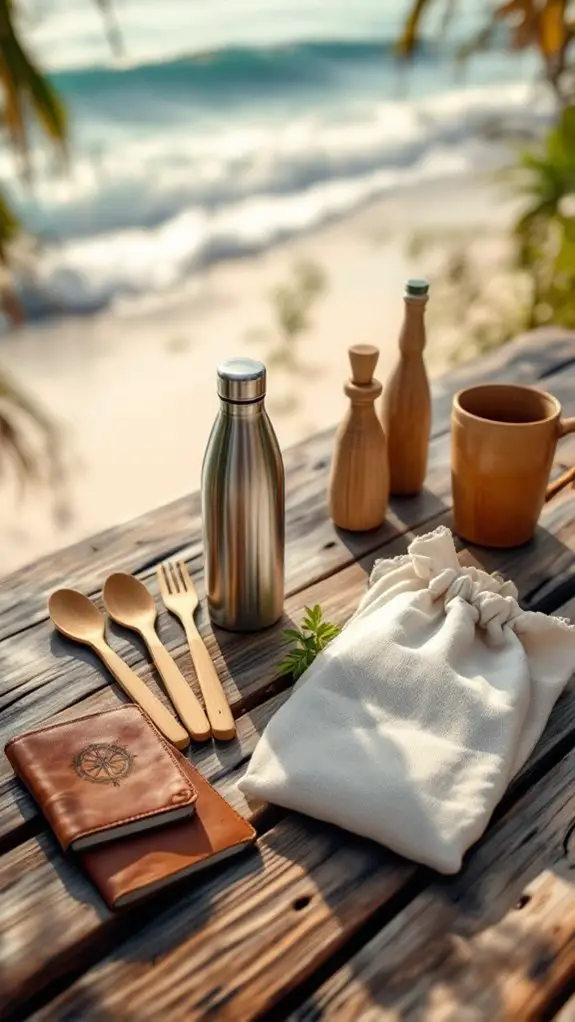
Traveling frequently presents unique challenges for maintaining a plastic-free lifestyle, but with careful planning, you can minimize your environmental impact while exploring the world.
Pack reusable essentials like a water bottle, coffee cup, cutlery set, cloth napkins, and collapsible food containers to avoid single-use plastics during your journey. Don't forget your cloth shopping bags and produce nets for local market visits.
When flying, bring an empty water bottle through security and fill it at drinking fountains after the checkpoint. Pack your own snacks in reusable containers to avoid plastic-wrapped airplane food.
If you're staying at hotels, decline housekeeping's plastic-wrapped amenities and bring your own toiletries in refillable containers. Choose accommodations that prioritize sustainability and support eco-friendly local businesses.
Research restaurants that use sustainable practices and aren't heavily reliant on disposable packaging. When ordering takeout, request no plastic utensils or excess packaging, and use your own containers when possible.
For transportation, opt for walking, cycling, or public transit instead of single-use ride-share vehicles. If you're renting a car, bring reusable ice packs and coolers for road trip snacks and drinks.
When shopping for souvenirs, select items made from natural materials and avoid plastic trinkets. Document your travels digitally instead of buying plastic disposable cameras or collecting plastic-heavy promotional materials.
Kids and Sustainable Living
Teaching children about sustainable living creates lasting impact that extends far beyond the family home. When you involve your kids in eco-friendly practices early on, you're helping shape a generation that understands environmental responsibility and takes action to protect our planet.
Start with simple habits that your children can easily grasp. You can teach them to sort recyclables, turn off lights when leaving rooms, and use reusable water bottles instead of single-use plastics. Make it fun by creating recycling games or starting a small garden where they can grow their own vegetables and learn about food sustainability.
Get your kids involved in plastic-free shopping by letting them bring their own cloth bags and containers to stores. You'll find they often become enthusiastic advocates, reminding family members to avoid plastic packaging and choose eco-friendly alternatives. Encourage them to make sustainable choices at school by packing waste-free lunches in reusable containers and using refillable pencil cases instead of disposable ones.
Transform sustainable living into a creative outlet by showing your children how to upcycle items. They can turn empty jars into pencil holders, create art from recyclable materials, or repurpose old clothing into cleaning rags. You can also involve them in composting, teaching them how food waste becomes nutrient-rich soil for your garden.
Remember to explain the 'why' behind sustainable choices. When children understand how their actions affect the environment, they're more likely to maintain these habits throughout their lives and influence others to do the same.
Mindful Home Organization
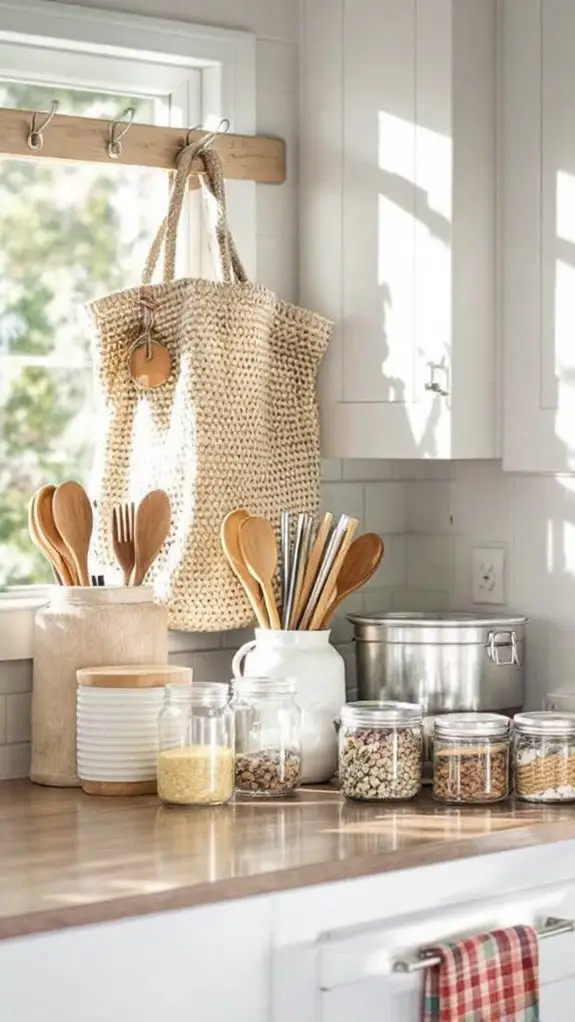
Along with reducing plastic waste, mindful home organization plays a crucial role in sustainable living. When you thoughtfully arrange your living space, you'll naturally consume less, waste less, and maximize the use of what you already own. Creating an organized, clutter-free environment helps you maintain a clear inventory of your possessions and prevents unnecessary purchases.
Start by categorizing your belongings into essential and non-essential items. You'll want to store frequently used items in easily accessible places using sustainable storage solutions like glass jars, bamboo containers, or repurposed boxes. For clothes and linens, use cotton storage bags instead of plastic bins, and install wooden or metal shelving systems that'll last for years.
Implement a "one in, one out" rule to maintain your organized space. Before buying something new, decide which item it'll replace. This practice prevents accumulation and guarantees you're making mindful purchasing decisions. Label your storage containers using paper or wooden tags to quickly identify contents and avoid buying duplicates.
Create designated zones for different activities: cooking, crafting, working, and relaxing. You'll find that when items have specific homes, you're less likely to misplace them or buy replacements unnecessarily.
In your kitchen, arrange your pantry with clear containers, making it easy to monitor food levels and prevent waste. Keep your recycling station well-organized with separate bins for different materials, making sustainable disposal effortless.
Zero Waste Beauty Routine
Building on the principles of home organization, your beauty routine offers another powerful opportunity to eliminate plastic waste. By switching to sustainable alternatives and simplifying your regimen, you'll reduce environmental impact while maintaining effective personal care.
Start by auditing your current products and replacing them with plastic-free options as they run out. Switch to solid shampoo and conditioner bars, which last longer than liquid versions and come in compostable packaging. Choose bamboo toothbrushes, natural loofah sponges, and safety razors with replaceable metal blades instead of disposable plastic ones.
For skincare, opt for bar cleansers, oil-based serums in glass bottles, and moisturizers in metal tins or glass containers. You can also create effective DIY solutions using ingredients like coconut oil, shea butter, and essential oils. Store these in reusable glass jars you already own.
Makeup alternatives include plastic-free mascara in metal tubes, powder products in metal compacts, and lip products in cardboard tubes or glass pots. Consider multi-use products to minimize packaging waste – for instance, a single tinted balm can work for lips and cheeks.
Don't overlook dental care: try tooth tablets instead of paste in plastic tubes, bamboo floss in glass containers, and wooden interdental brushes.
For feminine hygiene, switch to menstrual cups, period underwear, or organic cotton products in plastic-free packaging. Remember, making the shift to zero waste doesn't mean discarding current products – use what you have first, then make sustainable changes gradually.
Entertaining Without Single-Use Plastics
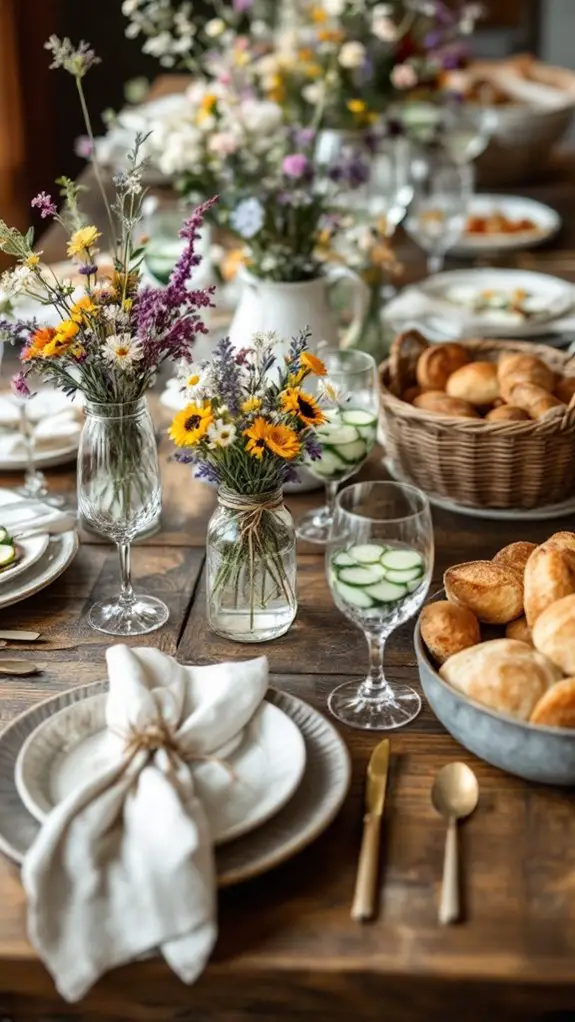
Hosting gatherings without single-use plastics may seem challenging at first, but it's entirely achievable with proper planning and reusable alternatives. You'll need to focus on reusable dinnerware, sustainable decorations, and smart food storage solutions to create memorable events without environmental impact.
Start by investing in a complete set of reusable plates, cups, and cutlery. Stainless steel, ceramic, or bamboo options work well for both indoor and outdoor gatherings. If you're hosting a large event and don't have enough supplies, consider borrowing from friends or renting from local party suppliers rather than buying disposables.
For beverages, serve drinks in large dispensers or pitchers instead of individual bottles. You can create stylish centerpieces using fresh flowers, potted plants, or LED candles rather than plastic decorations. Replace plastic straws with stainless steel or glass alternatives, and use cloth napkins instead of paper ones.
When it comes to food preparation and storage, opt for glass containers, beeswax wraps, or silicon bags. You can present snacks in wooden bowls or on ceramic platters, eliminating the need for plastic serving ware. For leftovers, encourage guests to bring their own containers, or keep a supply of clean, reusable containers on hand.
Consider digital invitations instead of plastic-coated paper ones, and use natural materials for party favors, such as seed packets or homemade treats in glass jars.
With these strategies, you'll create beautiful, sustainable celebrations that inspire your guests to reduce their own plastic consumption.
Seasonal Sustainable Living
Sustainability shines differently through each season, offering unique opportunities to reduce plastic waste and live more consciously.
You'll find that adapting your plastic-free habits to match the changing seasons can make your sustainable lifestyle more effective and natural.
In spring, you can start a plastic-free garden using wooden or terracotta containers, compost your own soil, and save seeds in glass jars.
Focus on growing your own herbs and vegetables to eliminate plastic packaging from store-bought produce.
Spring cleaning becomes an opportunity to replace plastic cleaning tools with natural alternatives like wooden brushes and biodegradable scrubbers.
Summer brings abundant farmers' markets where you can shop with reusable produce bags and baskets.
It's the perfect time to make your own plastic-free sunscreen using natural ingredients stored in metal tins.
Keep cool with homemade beverages in glass pitchers instead of buying plastic bottles, and pack plastic-free picnics using beeswax wraps and stainless-steel containers.
Fall's harvest season lets you preserve foods in glass jars and create your own dried goods storage system using bulk-bought items.
You can prepare for winter by making plastic-free holiday decorations from natural materials and planning ahead for gift-giving using sustainable wrapping alternatives.
During winter, focus on indoor activities like making your own personal care products in glass containers and crafting reusable items from natural materials.
Store winter gear in cedar boxes or canvas bags instead of plastic bins, and create warming beverages using loose tea leaves and plastic-free coffee brewing methods.
Low-Waste Work Life
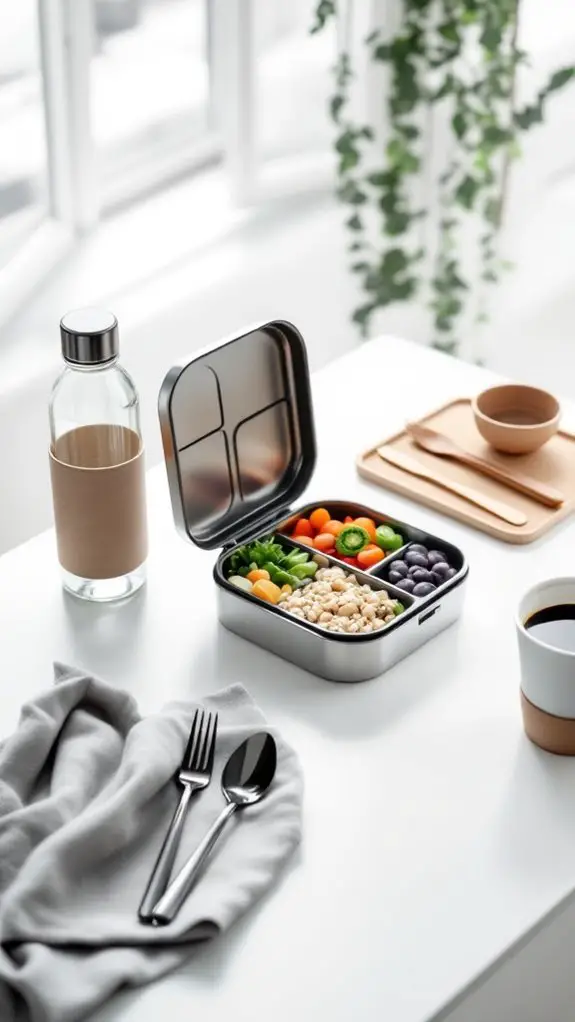
While managing a plastic-free home life flows with the seasons, creating an eco-conscious workspace presents its own unique challenges. You'll need to develop strategies that work within your office environment while maintaining professional standards and respecting shared spaces.
Start by evaluating your daily work routine and identifying plastic touchpoints. Replace disposable pens with refillable fountain pens or metal ballpoints, and swap plastic folders for recycled paper or bamboo alternatives. If you carry lunch to work, invest in stainless steel containers, cloth napkins, and reusable utensils. Keep a ceramic mug or metal water bottle at your desk to avoid disposable cups.
For meetings and presentations, opt for digital documentation whenever possible. When paper is necessary, choose recycled options and implement double-sided printing. Store documents in digital formats and use electronic signatures to reduce paper waste. If you're in a position to influence office purchases, advocate for plastic-free supplies and bulk ordering to minimize packaging waste.
Navigate office politics by leading through example rather than criticism. Share your sustainable choices only when asked, and make eco-friendly options available without pushing them on colleagues. Consider starting a green initiative committee to implement systematic changes like installing water filters or switching to plastic-free shipping materials.
Remember to plan ahead for business travel. Pack your own zero-waste essentials, including a reusable coffee cup, water bottle, and snack containers. When booking accommodations, choose hotels with sustainable practices and request plastic-free room service options.
Green Garden Practices
A thriving garden can flourish without relying on plastic materials or harmful chemicals. You'll find that implementing eco-friendly gardening practices not only benefits the environment but also produces healthier crops and reduces waste.
Start by creating your own compost using kitchen scraps, yard waste, and fallen leaves. This eliminates the need for store-bought fertilizers in plastic bags and provides nutrient-rich soil for your plants.
Collect rainwater in metal or wooden barrels to water your garden, reducing reliance on plastic watering equipment and conserving water resources.
Choose bamboo or metal tools instead of plastic ones, and store seeds in glass jars or paper envelopes. You can start seedlings in biodegradable containers like newspaper pots, egg cartons, or coconut coir pellets.
For plant markers, use painted stones, wooden sticks, or metal tags rather than plastic labels.
Control pests naturally by introducing beneficial insects, companion planting, and using organic deterrents like neem oil or diatomaceous earth.
Create natural borders with fallen branches, stones, or living hedges instead of plastic edging. When it's time to mulch, opt for leaves, straw, or wood chips rather than synthetic materials.
Save seeds from your strongest plants for next season's crops, storing them in paper envelopes or glass containers.
Trade seeds and cuttings with other gardeners to maintain diversity without purchasing plants in plastic pots.
Finally, use natural twine, bamboo stakes, or metal trellises for plant support instead of plastic ties or structures.
Sustainable Gift Giving
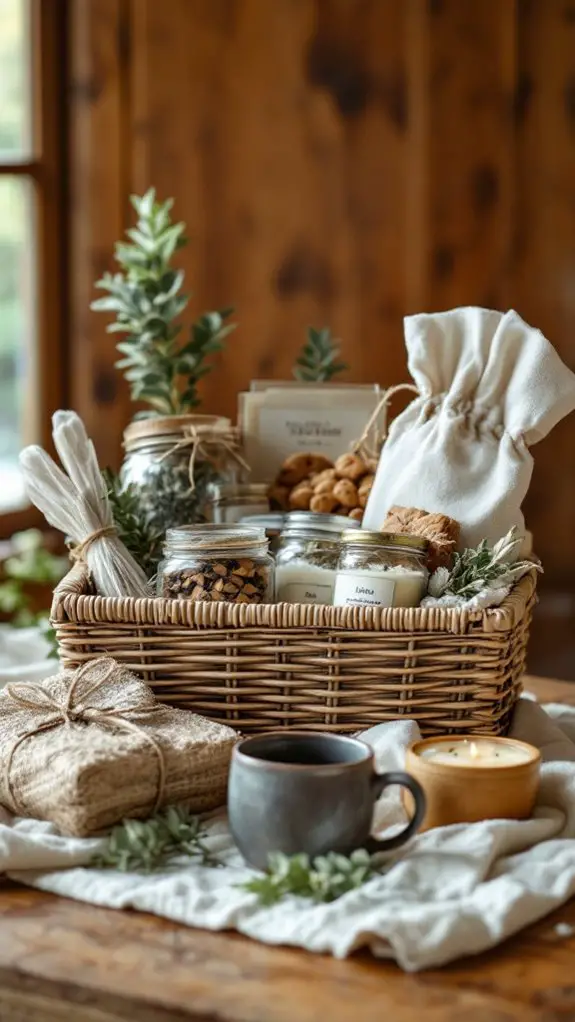
Making thoughtful choices about gift-giving can greatly reduce waste and environmental impact throughout the year.
You'll find that shifting to sustainable gift options not only helps the environment but often creates more meaningful experiences for both givers and recipients.
Consider giving experiences instead of physical items. Concert tickets, cooking classes, spa treatments, or outdoor adventures create lasting memories without generating waste.
If you're crafting homemade gifts, use natural or upcycled materials like beeswax candles, homemade jams, or hand-knitted items from sustainable yarn.
When wrapping gifts, ditch traditional wrapping paper, which often contains plastic and isn't recyclable.
Instead, use fabric wrapping (furoshiki), recycled paper bags, old maps, newspaper, or reusable gift boxes.
Secure packages with twine or paper tape rather than plastic tape, and skip the ribbon unless it's reusable.
For physical gifts, choose items made from sustainable materials like bamboo, glass, or stainless steel.
Look for products with minimal packaging and those built to last.
Consider second-hand treasures from antique shops or local vintage stores, which extend the life of existing items while adding character to your gift.
If you're buying for someone who's interested in sustainable living, opt for items that support their eco-friendly lifestyle: reusable produce bags, plastic-free kitchen tools, or zero-waste starter kits.
Remember to respect the recipient's preferences while gently introducing more sustainable options into their life.

Erzsebet Frey (Eli Frey) is an ecologist and online entrepreneur with a Master of Science in Ecology from the University of Belgrade. Originally from Serbia, she has lived in Sri Lanka since 2017. Eli has worked internationally in countries like Oman, Brazil, Germany, and Sri Lanka. In 2018, she expanded into SEO and blogging, completing courses from UC Davis and Edinburgh. Eli has founded multiple websites focused on biology, ecology, environmental science, sustainable and simple living, and outdoor activities. She enjoys creating nature and simple living videos on YouTube and participates in speleology, diving, and hiking.

